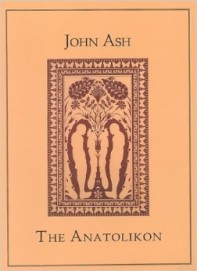 Nick Carbo
Nick Carbo
Tia Chucha Press ($10.95)
by Thomas Fink
The "bare-chested muscled Filipino" Ang Tunay na Lalaki, "the real man" in Tagalog, is a seventies/eighties TV-commercial character transplanted to nineties New York City by Nick Carbo in his engaging second book of poems, Secret Asian Man. The book even comes with its own anticipated review, imagined by Lalaki's "[white] American" fiancee:
"The main Filipino character
is depicted in poignant and hysterical
adventures which inform us about
the complex psyche of a recent immigrant's
postcolonial experience of attempting
to survive in the motherland. However,
the girlfriend-turned-wife is left
as a stick-figure with a nebulous past
and an insipid personality." ("Sally Speaks")
As a "displaced" "postcolonial" subject in a prime metropolitan site of "cultural diversity," Lalaki has his share of "poignant and hysterical adventures"—online, with a character named Orpheus, in "the real" Nick Carbo's poetry workshop, and as a secret agent. These escapades are entertaining. However, the book's significance involves the psycho political conflict between Lalaki's "addiction to New York," including the access to "Americanness" that the not-quite stick figure Sally embodies, and his historically grounded disgust at American racism.
In "Ang Tunay Na Lalaki Considers the Historical Consequences," Carbo adroitly juxtaposes Lalaki's musings on "early anti-miscegenation laws," "a frank" and scandalized "discussion in the mid-1930's by an American judge / in [Time] magazine about the sexual / prowess of Filipino males," and a Filipino-American's apt response to the racist judge that his people, "however poor, are taught / from the cradle up to respect and love [their] women" and thus boast a very low "divorce rate." Carbo's speaker concludes that the white American "myth / of the pin-size Asian penis" stems from this "little threat, perhaps." Lalaki relishes the fact that if he were to marry Sally, "they would be / legally practicing . . . savagely good / café con leche sex with rain forest honey to sweeten / the taste."
Another ironic history lesson appears in "Ang Tunay Na Lalaki Looks at the Early Americans," which traces the causes of "the unending cycle of prostitution to service / Americans which reached its height" recently "with 50,000 precious Filipina prostitutes" at U.S. bases. In "Ang Tunay Na Lalaki Tries to Explain to His Therapist," while covering anti-Native American genocide, black slavery, Manifest Destiny, etc., Lalaki makes a convincing case for his sustained anger, but Carbo implants some subtle ironies—most notably, confusion of the thirteenth and fourteenth amendments with the 1964 and 1965 Civil Rights Acts. Further, when Lalaki argues that "all your sins seem to be erased from memory, / given scant mention in text books," he ignores the recent textbook-transforming work of historians-of-color (and feminists).
For Lalaki, subtleties of the transitional character of nineties U.S. cultural politics do not jibe with his experience of polarities, as in the AOL Chat Room poem. Learning that Lalaki is Filipino, ClaraB calls him a "mongrel American" and assumes that he is "a SUB." He retorts that his "good manners . . . can be / . . . mistaken for submissive behavior." This poem, showcasing Carbo's experimental side, marvelously juxtaposes fragments of prurient, poignant erotic dialogue with solemn epistemological discourse by philosopher of science Karl Popper. Another superbly ironic poem, "Ang Tunay Na Lalaki Lies on the Bed," describes how Sally uses Lalaki as the nude, urinating, masturbating, cringing subject—more properly, object—of a film, replete with images and "racist songs" from the Philippine-American War, that garners an NEA grant.
Although Lalaki's workshop poems, "Sally's Resume" (yes, literally), and a clinical report on Lalaki's sleep apnea are far less effective as poetry than other texts, they offer raw documentation that enriches the collagistic texture and thickens the plot of Secret Asian Man, which stands as a narrative unfolding of Lalaki's hybrid destiny and his representation by self and other.
Click here to purchase this book at your local independent bookstore

Rain Taxi Online Edition, Winter 2000/2001 | © Rain Taxi, Inc. 2000



 John Ash
John Ash



